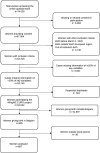Quality of care at childbirth during the COVID-19 pandemic in Belgium: a cross-sectional study based on WHO standards
- PMID: 39732493
- PMCID: PMC11683956
- DOI: 10.1136/bmjopen-2024-086937
Quality of care at childbirth during the COVID-19 pandemic in Belgium: a cross-sectional study based on WHO standards
Abstract
Objectives: To examine quality of maternal and newborn care (QMNC) around childbirth in facilities in Belgium during the COVID-19 pandemic and trends over time.
Design: A cross-sectional observational study.
Setting: Data of the Improving MAternal Newborn carE in the EURO region study in Belgium.
Participants: Women giving birth in a Belgian facility from 1 March 2020 to 1 May 2023 responded a validated online questionnaire based on 40 WHO standards-based quality measures organised in four domains: provision of care, experience of care, availability of resources and organisational changes related to COVID-19.
Primary and secondary outcome measures: Quantile regression analysis was performed to assess predictors of QMNC; trends over time were tested with the Mann-Kendall test.
Results: 897 women were included in the analysis, 67% (n=601) with spontaneous vaginal birth, 13.3% (n=119) with instrumental vaginal birth (IVB) and 19.7% (n=177) with caesarean section. We found overall high QMNC scores (median index scores>75) but also specific gaps in all domains of QMNC. On provision of care, 21.0% (n=166) of women who experienced labour reported inadequate pain relief, 64.7% (n=74) of women with an instrumental birth reported fundal pressure and 72.3% (n=86) reported that forceps or vacuum cup was used without their consent. On experience of care, 31.1% (n=279) reported unclear communication, 32.9% (n=295) reported that they were not involved in choices,11.5% (n=104) stated not being treated with dignity and 8.1% (n=73) experienced abuse. Related to resources, almost half of the women reported an inadequate number of healthcare professionals (46.2%, n=414). Multivariable analyses showed significantly lower QMNC scores for women with an IVB (-20.4 in the 50th percentile with p<0.001 and 95% CI (-25.2 to -15.5)). Over time, there was a significant increase in QMNC Score for 'experience of care' and 'key organisational changes due to COVID-19' (trend test p< 0.05).
Conclusions and relevance: Our study showed several gaps in QMNC in Belgium, underlying causes of these gaps should be explored to design appropriate interventions and policies.
Trial registration number: NCT04847336.
Keywords: Maternal medicine; Midwifery; PUBLIC HEALTH; Quality in health care.
© Author(s) (or their employer(s)) 2024. Re-use permitted under CC BY-NC. No commercial re-use. See rights and permissions. Published by BMJ Group.
Conflict of interest statement
Competing interests: None declared.
Figures


References
-
- World Health Organization WHO recommendations. intrapartum care for a positive childbirth experience. :200. - PubMed
-
- Lazzerini M, Covi B, Mariani I, et al. Quality of facility-based maternal and newborn care around the time of childbirth during the COVID-19 pandemic: online survey investigating maternal perspectives in 12 countries of the WHO European Region. Lancet Reg Health Eur . 2022;13:100268. doi: 10.1016/j.lanepe.2021.100268. - DOI - PMC - PubMed
Publication types
MeSH terms
Associated data
LinkOut - more resources
Full Text Sources
Medical
